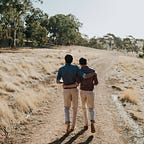Asylum Seekers or Criminals?
A critique on the handling of asylum seekers in Australia
“For those who’ve come across the seas, we’ve boundless plains to share.”
— Advance Australia Fair (Australian National Anthem)
I guess the above-mentioned line isn’t as big of a lie as it seems.
We proclaim what we have but state no actual willingness to fulfill the suggestion.
Not that we will share our land, just know that we could. Or maybe there is supposed to be an asterisk behind boundless plains — *the boundless plains are on specific islands which are lawfully parts of Australia but geographically look more like islands with antonymic names off the coast of Indonesia. But obviously, that would have ruined the beautiful, melodic flow that we all know and love.
On 31 August 2020, there were still 1,545 people in detention facilities in Australia. Despite being thousands of kilometres away from specialist medical care, the detention centre on Christmas Island has recently been reopened and is housing asylum seekers.
Self-harm has been reported at rates of 260 incidents per 1,000 people on Nauru and 54 incidents per 1,000 people on Manus Island. According to experts, these rates should be seen as conservative, due to the unlikelihood of asylum seekers to self-report. The prevalence of hospital-treated self-harm within the Australian community were at rates of 1.2 per 1,000.
Since August 2010 there have been over 40 deaths in on or offshore detention centres. As many as 16 of those are being treated as probably or confirmed suicides, with one man setting himself on fire, and one jumping off the roof of the centre after finding out he was going to be deported. Moreover, a further number of refugees died on their way to receive medical treatment, with one refugee being flown from Christmas Island to Adelaide, over 4200km away and bypassing two major cities.
“My country and my religion is a target for Taliban. There were many bomb blasts and always big wars and terrible attacks. Shia people have arms, legs, noses hacked off, necks slashed, plus there is rocket fire and missiles. This is because I am Shia. All this means no one is safe and now because I escaped. I am in detention.”
(Unaccompanied child, Nauru Regional Processing Centre, May 2014)
“I didn’t want to live in this world any more. I don’t want to be alive the next day. I didn’t want to get up. I didn’t want to open my eyes. No hope. Disappointed. Even I couldn’t bear my family. My children, my husband. I didn’t want to see them. I couldn’t bear to hear them. I was embarrassed in front of my children because I felt guilty because I did something horrible to my children [by bringing them to Australia].”
An asylum seeker living with breast cancer on Nauru.
“You can never imagine how people live here. Sometimes we are unable to buy drinking water and so we drink the bathroom water. Three days ago I had a stomach problem. Sometimes I run out of money for food and I don’t eat for days.”
An asylum seeker from Somalia, who sought refuge after the murder of her husband, abduction of child and being held hostage for five years.
Now more than ever, during the COVID-19 pandemic, the poor and inhumane treatment of the asylum seekers is evident. Despite having confirmed cases, refugees “continue to be held in cramped conditions, as many as six to a room,” Detention centres have also experienced periods of no or limited access to soap, toilet paper, and medication. Despite this, the Australian government has not intervened and has instead put forward a bill to the Senate, after passing through the House of Representatives, to forbid mobile phones in the detention centres. This would forbid the only connection refugees would have with the outside world.
Is this something we are proud of? Is this how we treat each other? Is this something we want to be remembered by?
You have to questions; if someone is willing to withstand such inhumane conditions for an unforeseeable amount of time, what did they have to withstand at home?
How to help:
Amnesty International is campaigning for “a fairer sponsorship program (that) would allow everyday Australians and their communities to support refugees in coming to Australia and settling into the community.” https://www.amnesty.org.au/cspresources-2/
Sign the petitions
- https://www.amnesty.org/en/get-involved/take-action/stop-abuse-two-thousand-people-in-nauru-manus-island/
- https://greens.org.au/campaigns/close-the-camps
-https://www.change.org/p/stop-the-spread-of-covid-19-in-immigration-detention-centres-saferathome
If you’re an Australian, find your local member and contact them directly: https://www.aph.gov.au/senators_and_members/members
